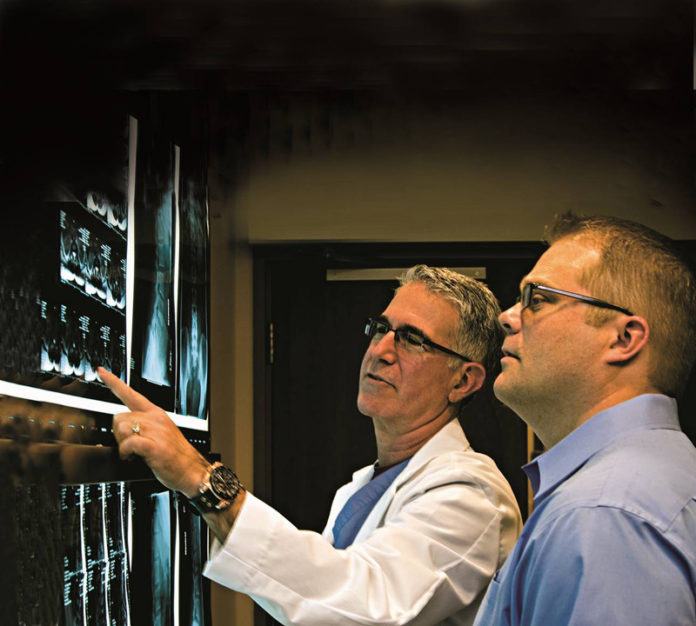
(Corrected, March 10, 4:26 p.m.)
Florida-based Laser Spine Institute employs 500 people in five states and draws a majority of its customers, or patients, from out of state. That helps both the company’s bottom line and that of local hotels, eateries and other related businesses.
The company, headquartered in Tampa, thinks the “medical-tourism” business model it says has worked so well in sunny Florida could also succeed in luring patients to the Ocean State.
According to a study by the University of South Florida College of Business, 79 percent of the institute’s patients come from out of state, in parties averaging 2.93 persons with an average length of stay of 4.85 days. Patient spending contributed $14.9 million to the Tampa economy in 2012.
The institute sent representatives to Rhode Island in December, conferring with Rep. Joe McNamara, D-Warwick, and J.R. Pagliarini, chief of staff of the R.I. Commerce Corporation, about a possible Warwick location. Legislation filed by McNamara seeks to pave the way for the institute to bypass normal state certificate-of-need requirements but has uncertain prospects, in part because it involves an unrelated company. The bill would also introduce a moratorium on the purchase of new medical equipment in the state until July 2015 that has met with opposition.
The institute’s interest in Rhode Island, however, raises a business concept – medical tourism – that few, if any, Rhode Island-based businesses have been involved in.
“I have never tracked medical tourism,” Dale Venturini, president of the Rhode Island Hospitality Association, told Providence Business News. “It’s the first I’ve heard of it. With privacy issues, as far as it relates to health care, it’s really hard for someone coming to the state to receive treatment to admit that they are here for that reason. I don’t know how they would track that.
“I’m looking out the window to the snow,” she said recently. “Tampa and [Rhode Island] are a little bit different.”
“To become a hub you have to have the medical infrastructure, but you also have to have the other components: airports, railway, hotels, tourism attractions, restaurants,” said Harkins. “For hitting the trifecta – quality care, affordable care and then an attractive destination – Rhode Island is right there.”
Medical tourism has existed as long as people have been sick and had the ability to travel, says Harkins.
“People back in the early civilizations in China would travel across borders to get whatever kind of herbs or cures they could find,” Harkins said.
Modern-day medical tourism leads patients across county lines, state lines, and national lines, not to mention the international date line. A North Carolina patient needing a knee operation can pay half as much for the surgery in Costa Rica that that she would have had to pay at home, according to an article published Feb. 14 in the Economist.
A different form of medical tourism within U.S. borders involves large, self-funding employers inking deals with major medical centers that agree to provide surgeries at reduced rates, with the providers making their money based on high volumes.
“A lot of companies are setting up contracts with certain facilities where they can receive bundle payments,” said Harkins. “Cleveland Clinic, Johns Hopkins, there are a number of sites, they’re called centers of evidence, and they’re throughout the United States.”
Some of the large corporations save so much money that they sweeten the pot for employees to travel to the treatment hub the company has chosen for them by guaranteeing no out-of-pocket costs, money for travel expenses, and travel agents who book the trips for the employee, he said.
The institute is considering Rhode Island due to its ability to serve as a hub for its services in New England, and sees Warwick’s T.F. Green Airport and associated rail link as advantages.
It insists it is not looking to compete with hospitals or other local medical providers.
“Our goal is not so much to provide an alternative to existing Rhode Island institutions but to provide a magnet for the wider New England market,” explained Jamie Adams, chief strategy officer for the institute.
The institute estimates that it would draw more than 85 percent of its patients from outside the Rhode Island market, and have a $30.1 million economic impact locally.
It offers four types of minimally invasive endoscopic spine procedures, including minimally invasive stabilization. The institute claims the risk of infection and blood loss are both significantly lower than during traditional open back surgery, and their procedures require no hospital stays.
McNamara’s bill may face an uphill climb in the General Assembly, but he’s convinced medical tourism is a segment of the health care economy worth exploiting.
“I believe that this is the tip of the iceberg, and others will follow,” said McNamara, who says he’s been invited to speak at the World Medical Tourism Association International Congress in September in Washington, D.C. •
The original version of this article omitted Laser Spine Institute’s Houston location.












